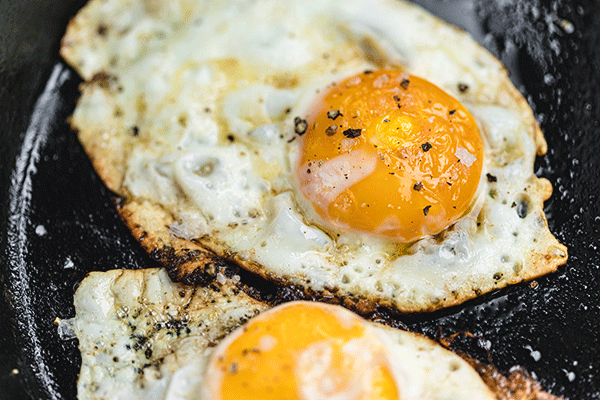Rumours abound that high welfare hens produce orange egg yolks, but that’s not necessarily true. Wicked Leeks spoke to quality control expert at organic veg box company Riverford, Rowan Green, to find out more.
Why are some egg yolks more orange than others and how is this linked to the lifestyle of the hen?
Rowan Green (RG): The colour of an egg’s yolk is determined by the level of carotenoids present in the hen’s diet. The yolks of, say an organic hen with a wide-ranging diet and access to outdoor foraging will vary throughout the year depending on what they are eating and the availability of high carotenoid foods.
Is it true that a more orange yolk equals a higher welfare hen, and a more highly nutritious egg?
RG: Not necessarily. The shade of a yolk is determined by the level of carotenoids in the hen’s diet. Therefore, this can be manipulated by simply changing the chicken’s feed to a more carotenoid rich diet. Due to the perception that eggs with darker yolks are healthier, many conventional egg producers will put additives in their hens’ feed to produce a more desirable colour.
There is a similar perception with egg-shell colour. In the US, eggs with white shells are viewed as ‘healthier’, whereas here in the UK the opposite is the case. There really is little difference between the two as the colour is determined by the breed of chicken. But due to these cultural perceptions, most eggs sold in the US are white shelled, whereas here you rarely see them.

What are carotenoids and how are they linked to nutrition, of human and of hen?
RG: Carotenoids are phytonutrients (plant pigments), which play an important role in photosynthesis. They are commonly found in brightly-coloured fruit and vegetables such as, well, carrots and peppers. People and animals cannot produce carotenoids and so need to absorb them through their food. They have antioxidant properties and so are said to have anti- inflammatory properties and may even play a role in protection against cancer.
What makes organic hens different in terms of their diet?
RG: Organic hens have much stricter controls on what they are permitted to be fed than conventional or free-range hens. Applying extra carotenoids as an additive in their feed would not be allowed under organic regulations; only carotenoids that occur naturally in the hens’ diet would be consumed. Organic hens must have substantial outdoor access as well to accommodate their instinctive foraging behaviour, and so their diets tend to be more varied and natural.
What are the signs of a high welfare hen, through its eggs?
RG: The most typical sign would be variation. Subtle changes in yolk colour throughout the year indicate that the hens have access to outdoor food sources which will vary with seasonal availability of insects and seeds. Consistent yolk colour throughout the year would imply that the hens are mainly reliant on standardised feed and may not have significant outside access and outdoor food sources.
Is this myth of orange yolks equalling health, similar to the pink dye added to salmon to turn the flesh pink? What does that tell us about perception of health and animal welfare compared to farming realities, in your view?
RG: In theory, a deeply orange egg simply indicates that the hen which laid it has a diet high in carotenoids. However, as explained above, this ability is now manipulated by egg producers feeding their hens additives to exploit this perception, so you can no longer simply rely on colour as being an indicator of hens with high welfare and varied diets.
It is not enough to simply assume that because your egg yolks are a deep rich orange that the chicken is being fed a ‘healthier’ diet and therefore producing healthier eggs. As usual, it pays to question long held wisdoms about what we are eating and to research the standards that apply to our food.












0 Comments